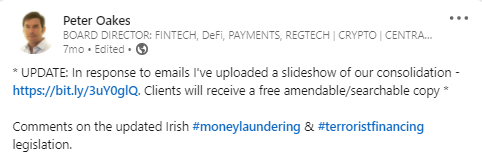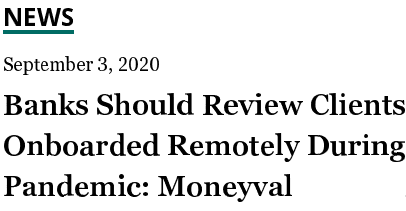AuthorPeter Oakes is an experienced anti-financial crime, fintech and board director professional. Archives
January 2025
Categories
All
|
Back to Blog
Contact Peter Oakes at the details here or via Linkedin if you want to know more about how I help fintech businesses get authorised in Europe and the UK and my non-executive director services to regulated fintech, MiFID and banks. Friday 2 June 2023: Bank of Lithuania has revoked the licence of the electronic money institution Transactive Systems UAB and fined it €280,000 for seriously and systematically infringed anti-money laundering and counter terrorist financing (AML/CTF) requirementsIn 2022 Transactive Systems UAB was second among Lithuanian electronic money and payment institutions in terms of annual turnover (€13.1 billion), with operating income amounting to almost €4mn. In revoking its electronic money authorisation, the Bank of Lithuania said that the following “main violations and deficiencies were identified” at the regulated #fintech firm Transactive Systems UAB:
 * including that institution's immediate and retrospective monitoring of transactions was ineffective, the selected monitoring model did not correspond to the volume of processed transactions, suspicious transactions were not reviewed and properly analysed. * measures aimed at determining whether the client's funds and assets were not obtained directly or indirectly from a criminal act or by participating in such an act were of poor quality and insufficient. If these are a description of the ‘main violations and deficiencies’ identified, what else was going on? Over the past few weeks at events like ACAMS (ACAMSAssembly ACAMSEurope) Joby Carpenter Craig Timm Natasha Powell Shelley Schachter-Cahm and I discussed the situation of fintech and financial crime controls. Many others and I had great discussions about good fintech companies having their reputations impinged by a few bad fintech actors both big (yes some fintech banks who know who they are and some from China who know who they are) and small (some from the east side of the EU bloc, Israel and disturbingly some regulated fintech firms from the UK who also know who they are) whose mentality is that an authorisation is akin to a driver's licence exam. They also often say if country A doesn't jump to our demands, then we will go to country B and will whine to your ministers and FDI agencies. "How did Transactive Systems UAB get through what is supposed to be a thorough and rigorous common EU approach to regulatory authorisation by national competent authorities (NCAs) in the first place?" While it is good to see such decisive regulatory action here, the question has to be asked "How did Transactive Systems UAB get through what is supposed to be a thorough and rigorous common EU approach to regulatory authorisation by national competent authorities (NCAs) in the first place?" Particularly given the lengths that many EU authorities go to verifying the existence, performance and execution of the #financialcrime business wide risk assessments, the risk registers, the risk appetite statements, #moneylaundering policies and procedures under EBA Guideline 14 and the vetting of managers, owners and directors of #blockchain emoney and #blockchain payments. Did this company say one thing, and then do the polar opposite? Did the regular trust but not verify? Interestingly, back in January 2023, the Bank of Lithuania restricted the activities of the company by instructions:
The news cannot but help take us to:
Well run regulated fintech must be getting depressed. Banks will jump on this example as evidence that fintechs cannot be trusted to do #AML properly and some regulators might do so too, recalibrating their supervisory engagement models. Those going through authorisation will find it tougher to satisfy their future regulator compared to others who went through the process a few years ago. Well run regulated fintech must be getting depressed. Banks will jump on this example as evidence that fintechs cannot be trusted to adhere AML, sanction and financial crime laws properly and some regulators might do so too, recalibrating their supervisory engagement models. Those going through authorisation will find it tougher to satisfy their future regulator compared to others who went through the process a few years ago. Another telling issue in this case is the fact the Bank of Lithuania says that it “has received many complaints and inquiries from individuals and legal entities of various European Union countries and financial market supervisory authorities regarding possible fraud related to clients of Transactive Systems UAB or accounts opened there. Although the Bank of Lithuania has repeatedly drawn the institution's attention to the importance of money laundering and terrorist financing risk management and fraud prevention, gross and systematic violations of the legal acts regulating the prevention of money laundering and terrorist financing were identified during the inspection.” This comes across really weak. Separately, getting really tired of hearing from people who should know better saying that "I will not apply to country A for my authorisation (recommend my client not to do so) because I hear it is easier and faster at country B". While I am not saying that country B is Lithuania, it is news that one would have to share as a both a positive and negative when asked "Peter what are the best 3-5 EU member states you would suggest for a fintech authorisation and why?" It's a question I am asked every month. And you know what, the answer is ‘It depends – on your business model, access to banking services, access to talent and reputation of the regulator’ to name but a few points. Contact Peter Oakes at the details here or via Linkedin if you want to know more about how I help fintech businesses get authorised in Europe and the UK and my non-executive director services to regulated fintech, MiFID and banks.
Links to sources: 1) Bank of Lithuania Announcement of 2 June 2023 2) Previous restriction imposed on Transactive Systems UAB on 20 January 2023 3) Linkedin Post HERE
1 Comment
Read More
Back to Blog
Friday 20th January 2023: Central Bank of Ireland (CBI) issued a Dear CEO letter to the fintech industries of electronic money institutions and payments institutions. The purpose is to reaffirm the CBI's supervisory expectations built on its supervisory experiences, both firm specific and sector wide, and enhance transparency around its approach to, and judgements around, regulation and supervision.
If you are looking to get authorised as an electronic money or payments institution in Ireland, contact us. We are working with a number of such applicants and we advise those already authorised on their on-going regulatory obligations, business models and strategy. See our Authorisation Page with links to useful Authorisation Guides. Busy start to the year with enquiries from UK, Asia and the US continuing to roll in about the benefits, opportunities and challenges of establishing a EEA regulated presence in Ireland, particularly for #emoney and #payments. While Ireland is in the top three of the final round, there remains stiff competition (so to speak) from two other leading jurisdictions. Thus it was good to see, , as I am sure others will agree, the Central Bank of Ireland most recent Dear CEO letter issued to emoney and payments institutions on Friday 20 January 2023 by Mary-Elizabeth McMunn, Director of Credit Institutions Supervision. It will help provide greater clarity not only to currently authorised emoney and payments firms, but also those in the authorisation pipeline and those thinking of filing in Ireland. It is a meaty document at 5,168 words across eleven (11) pages. Download a copy of the letter and additional relevant reading material here - https://complireg.com/blogs--insights/2023-dear-ceo-letter-re-supervisory-findings-and-expectations-for-payment-and-electronic-money-e-money-firms If you wish to get a quick understanding of the letter in terms of your regulatory obligations search the words 'we expect'. You will see those appear eleven (11) times too! Right now, best to mark in your calendar and work backwards, that an audit opinion on safeguarding, along with a Board response on the outcome of the audit, is to be submitted to the CBI by 31 July 2023. And it is not just a case of ringing your current external auditors and appointing them.
The purpose of the letter is to reaffirm the CBI's supervisory expectations built on its supervisory experiences, both firm specific and sector wide, and enhance transparency around our approach to, and judgements around, regulation and supervision. The breakdown of the letter is as follows: (1) Supervisory Approach for the Payment and E-Money Sector (provides wider and specific context to our supervisory approach). (2) Supervisory Findings (key findings from supervisory engagements over the last 12 months and actions the CBI expects firms to undertake) ➡ Safeguarding; ➡ Governance, Risk Management, Conduct and Culture; ➡ Business Model, Strategy and Financial Resilience; ➡ Operational Resilience and Outsourcing; ➡ Anti-Money Laundering and Countering the Financing of Terrorism;
(3) Conclusion and Actions Required (CBI's expectation that this letter is provided to and discussed with your Board, and any areas requiring improvement that directly relate to your firm are actioned). Next Steps: Get in contact with Peter Oakes / CompliReg. Founded by the CBI's inaugural Director of Enforcement and AML/CFT Supervision & board director of payments, emoney and MiFID companies. Peter is also a former: FSA (now FCA) enforcement lawyer; senior officer (legal) at ASIC; and adviser to the deputy director of banking at SAMA. Further Reading: 10 December 2021: Authorisation Guidance and Supervisory Expectations for Payment and Electronic Money Firms (Central Bank of Ireland) 09 December 2021: Central Bank of Ireland Dear CEO Letter on Supervisory Expectations for Payment and Electronic Money (E-Money) Firms
Back to Blog
* UPDATE: In response to emails I've uploaded a slideshow of our consolidation - available here. Clients will receive a free amendable/searchable copy *
Comments on the updated Irish #moneylaundering & #terroristfinancing legislation. What: Ireland signed into law the Criminal Justice (Money Laundering and Terrorist Financing) (Amendment) Act 2021 (the “2021 Act”). The 2021 Act (No. 3 of 2021) makes a number of changes to the 2010 Act (No. 6 of 2010) When: 18 March 2021. Legislation passed by Oireachtas (signed into Law by the President of Ireland). The 2021 Act takes effect on Friday 23 April 2021 with remaining legal provisions taking effect on the following day (23 April 2021). A copy of the commencement order is available here. Action: Time to update your #Compliance & #FinancialCrime Risk Frameworks, Risk Assessments, Policies, Manuals & Procedures. What areas of the 2010 Act are impacted that you need to know and take into account to update your compliance documents? See the comments section below where I've listed the areas from the 2010 Act impacted by the 2021 Act. How: Contact the team at CompliReg. We are undertaking several reviews of policies, procedures and manuals in light of the recent changes made to Irish AML/CTF law. We have tracked the changes in our consolidation of the 2010 Act up until and including Act No 3 of 2021. Contact the team at [email protected] with your business contact details for a discussion of a review. Further Reading: Money Laundering - Amendments to implement 5th AMLD into Ireland (18 March 2021)
Back to Blog
Peter Oakes, fintech and financial crime expert talks to Gabriel Vedrenne of ACAMS MoneyLaundering.com about European financial institutions that switched to onboarding all new clients remotely at the height of COVID-19 lockdowns should review their customer files to ensure that adequate due diligence was conducted as per the European anti-money laundering standard setter warned.
CLICK HERE |
© CompliReg.com Dublin 2, Ireland ph +353 1 639 2971
| www.complireg.com | officeATcomplireg.com [replace AT with @]
| www.complireg.com | officeATcomplireg.com [replace AT with @]






